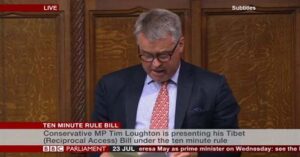This week saw an important development in the United Kingdom Parliament on behalf of Tibet by members of the All Party Parliamentary Group for Tibet (APPGT), which is administered by the Tibet Society UK. The APPGT Co-Chair Tim Loughton introduced a Ten Minute Rule Bill. These are used by back bench Members to raise issues. Few Bills introduced through this process make it to legislation but some do, and a number of MPs across parties have supported the Tibet Bill which proposes that the Secretary of State for Foreign Affairs be required to report annually on access by British nationals as compared with other regions of China: to make provision to deny persons involved in imposing such restrictions permission to enter the UK. Tim Loughton began his speech saying,
In May, in my role as chair of the all-party group for Tibet, I attended the seventh world parliamentary convention on Tibet in Riga, Latvia, together with the hon. Member for Dundee West (Chris Law), who I am delighted is in the Chamber today. We joined parliamentarians from around the world, representatives of the Tibetan Parliament in exile based in Dharamshala, and His Excellency Lobsang Sangay, the Sikyong or President of the Central Tibetan Administration since 2012. We were pleased to receive the Sikyong in this place, and that he met you, Mr Speaker, just a few weeks ago. At the convention, we discussed continued human rights abuses of Tibetans at the hands of Chinese security forces; the routine intimidation of Tibetans, their supporters and the Dalai Lama himself around the world; the assaults on the Tibetan language, and the culture, religious practices and way of life of Tibetans generally; and the continued population transfer of Chinese into Tibet to dilute and smother further the Tibetan identity. We also debated at length the environmental degradation being waged on the Tibetan plateau, which has led to an unprecedented number of natural disasters, caused by the impact of excessive and unsustainable mineral extraction and dam construction in an area whose rivers service some 40% of the world’s population; as well as the accumulation of waste and the dumping of toxic waste on the plateau and in Tibet’s waters. We discussed, too, the tragic self-immolation of more than 150 Tibetans in protest against Chinese persecution in Tibet, and the continued human rights abuses generally. We all signed up to the Riga declaration, which requests China to resume the dialogue with envoys of His Holiness the Dalai Lama without preconditions, because the Tibetan struggle has always been a peaceful one. He said the Chinese embassy had rung him and pressured him not to put the bill.
He continued, We can no longer sit idly by. All attempts to shed light on human rights abuse through the universal periodic review of the UN Human Rights Council have been snubbed, and continue unabated and largely in secret. The Foreign Press Association has reported that it is easier for Beijing-based journalists to visit North Korea than to visit Tibet.
Recently we have seen the latest attempts at repression by the Chinese: Foreign diplomats, parliamentarians, journalists and even UN officials are almost always denied visits to the region, other than on rare official tours carefully orchestrated by the Chinese authorities. At the same time, Tibetans are regularly prevented from travelling outside China, and those passing information abroad are punished severely. A prominent example is Tashi Wangchuk, a young language rights advocate who last year was sentenced to five years in prison, just for giving an interview to The New York Times about his efforts to protect Tibetans’ mother tongue.
The House agreed that the Bill should be printed and given a Second Reading where it should receive strong support. The full speech can be read online in the Hansard Report of the House of Commons of July 24.





 Print
Print Email
Email